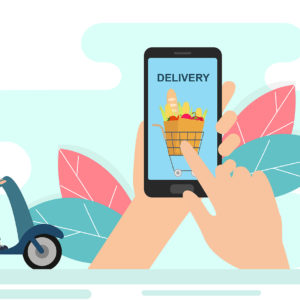The pandemic has, for better or worse, forced us to live online. That has made internet retail, digital services and delivery apps a godsend for millions of us sequestered at home.
This entirely new sector of the economy has allowed us to safely buy and enjoy without the risk of coronavirus. At the press of a button, your favorite food and drinks are magically delivered to your door.
But as you bite into your meal delivered by Grubhub, Uber Eats or DoorDash, there is a movement afoot to make that even more difficult.
Getting in between you and your food delivery is a coalition of advocacy groups working around the country to regulate, limit and severely restrict companies that offer delivery via applications.
Dubbing themselves “Protect Our Restaurants,” this Washington-based coalition of social justice groups is calling on state and local government to cap the commissions on delivery service apps.
They have already been successful in the District of Columbia, Seattle and San Francisco, where commission rates for food deliveries are now capped at 15 percent. And there is a bevy of other city councils lining up to join them, some wanted an even lower cap at 5 percent.
They claim delivery companies, the same ones that have empowered consumers, given vast new capabilities to restaurants and provided good income to couriers, are “exploiting” each of these groups in pursuit of the almighty dollar.
The hospitality industry is already on its last leg due to state-imposed lockdowns. Why would getting in the way between you and your next hot meal be the new issue of economic and social justice?
In July, it was projected by the NPD group that restaurant deliveries made up as much as 7 percent of food orders, 50 percent more than pre-pandemic. That number is underestimated, but it proves the rush is not yet over.
That means more customers are using food delivery apps to put meals on the table, sampling restaurants and kitchens so desperate for the income. And that service comes at a price.
For orders placed through a delivery app to a restaurant, the app charges either a flat or percentage-based fee as a commission, which funds the logistics, the courier’s pay and marketing costs. This amount varies between 13.5 percent and 40 percent, depending on which options a restaurant agrees to when they sign up.
It is that variance in commission rates that so enrages activists in this space. Plenty of anecdotes have swarmed social media warning of high fees for conducting businesses through the apps.
And while these caps on commission are well intended, they are counter-productive.
It will mean fewer order volumes that can be processed, less money will be available to couriers who sign up to deliver for the app, and apps will have to limit which businesses they accept. That would hurt restaurants, couriers and consumers who depend on these services.
This would end up hurting more people than it purports to help. That would be both anti-consumer and anti-innovation in the same fell swoop, which seems bonkers several months into a pandemic.
The other complaint mounted is antitrust concerns, similar to congressional hearings against Apple, Amazon, Facebook and Google earlier this month. Activists want to use the weapons of the Federal Trade Commission to break up the “monopoly power” of delivery services.
Most of these companies, however, are true American success stories. They have existed for less than 10 years, have pivoted multiple times, expanded their services, and found a good niche empowering restaurants to quickly and reliably get their food to delivery customers.
Thousands of delivery workers have quick and easy work, giving much-needed income to students, those between jobs, and people who want extra income. They often contract with multiple services, depending on which offers the highest commission per delivery, similar to rideshare drivers.
The benefits to restaurants are also clear: less money is spent on hiring a delivery driver or vehicle, commissions charged are transparent and partnering with a well-known app helps attracts more customers who would otherwise never order from that specific restaurant. Most of these restaurants likely never had delivery before they signed up for these apps. That is hardly a case for trustbusting.
If those aiming to regulate food delivery companies and are successful in doing so, they’ll set up a paradox of their own making: the only companies that will be able to comply with the regulations and caps will be the firms with the most capital and resources. This would lockout any potential new competition and do more to restrict consumer choice than enhance it.
The last few months have provided every consumer with plenty of uncertainty. Being able to order products right to our door, though, has been a blessing.
Intervening in the market to undermine the choice of consumers and business contracts with restaurants would make that process arguably worse, and not better.

